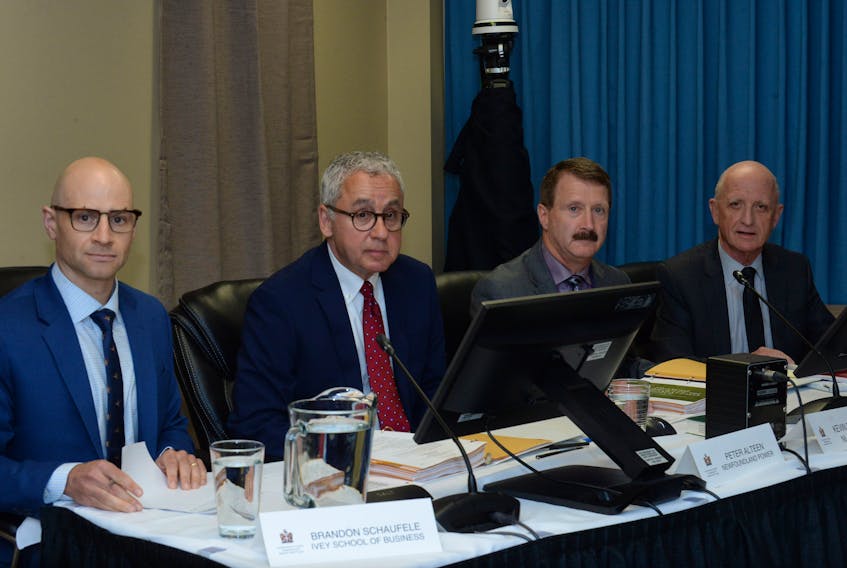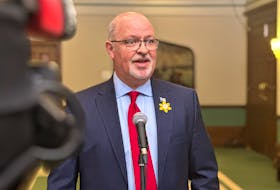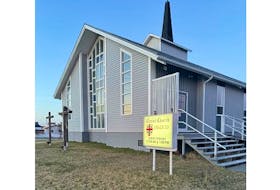ST. JOHN'S, N.L. — A $12.7-billion cost for the Muskrat Falls project is more than energy ratepayers in Newfoundland and Labrador can handle. That’s openly acknowledged by electrical utilities and the provincial government.
The Liberal government has committed to rate mitigation, to keeping residential rates to 13.5 cents per kilowatt hour in 2021, with a controlled increase thereafter, and similarly helping industrial customers. But there is a lot to consider — including whether or not it might be better to set a higher target price for power in 2021.
The Public Utilities Board (PUB) is digging into the options for managing the cost, and will make recommendations to the provincial government. The final decision on where tax dollars will be applied, versus where ratepayers can and will pay, will be up to the government.
The Muskrat Falls Inquiry will not deal with what should be done on power rates. But on Tuesday, Commissioner Richard LeBlanc had the sheer burden of the project’s cost put on record.
“This commission (…) we’ve been talking for months now about billions of dollars, and three hundred million here, a hundred million there, as if it’s like a dollar and change,” he said. “And I think it’s important for us sitting here and as well for the public who may well be watching, to be able to look at this in a little different light — in the sense of what it actually means to the individual who’s living in a home with a family, who’s trying to provide for their family, and that was one of the reasons why I wanted to deal with this.”

Over the course of the day, LeBlanc heard from eight witnesses, who appeared as a panel on the subject of the project’s financial implications.
Newfoundland Power president Peter Alteen said customers are concerned or simply uncertain about the future. The utility heard it all when in 2017 Nalcor Energy president and CEO Stan Marshall announced the current price for the project.
“It was one of the most severe reactions I’ve seen in 30 years in the business,” Alteen said.
Newfoundland Power records show heat pump installations increased by 58 per cent in 2018.
There are new incentives in the mix, but Alteen described it as a reflection of fear over where rates might go. On the industrial side, he said a major customer has raised the idea of moving off-grid.
Newfoundland Power is taking some comfort in the government’s plans for rate mitigation. It is a long-term commitment though, and not a one-year expense.
Bernice Hancock, with the Community Education Network, spoke about higher power bills with existing social challenges.
“What we’re finding (now) is people on income support don’t necessarily have any money for food,” she said, noting increased food bank usage in her area in the current economy.
Organizations in the non-profit sector also have power bills. They face a double whammy of lower donations and higher operating costs, with fear of reduced government funding, all tied to Muskrat Falls.
Newfoundland and Labrador Association of Public and Private Employees (NAPE) president Jerry Earle told The Telegram he was surprised by the inquiry’s invitation, but pleased. Earle said people in the public sector are poised to be hit by the project’s cost multiple times over, particularly if money is shifted from direct services to help cover costs over the next few years.
The project is already being mentioned in the context of collective bargaining, he said.
How much is the Muskrat Falls bill? Earle's presentation stated, using an average $65,000 per year salary, including benefits, $700 million for annual rate mitigation would be equivalent to 11,500 jobs.
The Liberals say about $726 million is needed to keep rates at 13.5 cents per kilowatt hour in 2021.
The draft rate mitigation plan (to be finalized following the PUB’s report) sketches out a $200-million federal contribution (yet to be agreed upon); a $200-million contribution from Nalcor Energy that would otherwise have reached the public coffers; reduced expenses in the electrical system, including in Muskrat Falls operations and maintenance; fuel cost savings; electrification of public buildings; and more — but not any transfers from programming.
Other witnesses were professor Brandon Schaufele, from Western University; former NDP leader and former MHA Lorraine Michael; Consumer Advocate Dennis Browne; Newfoundland and Labrador Hydro manager of rates and regulation Kevin Fagan; and deputy minister of Finance Denise Hanrahan.

Twitter: @TeleFitz
RELATED









